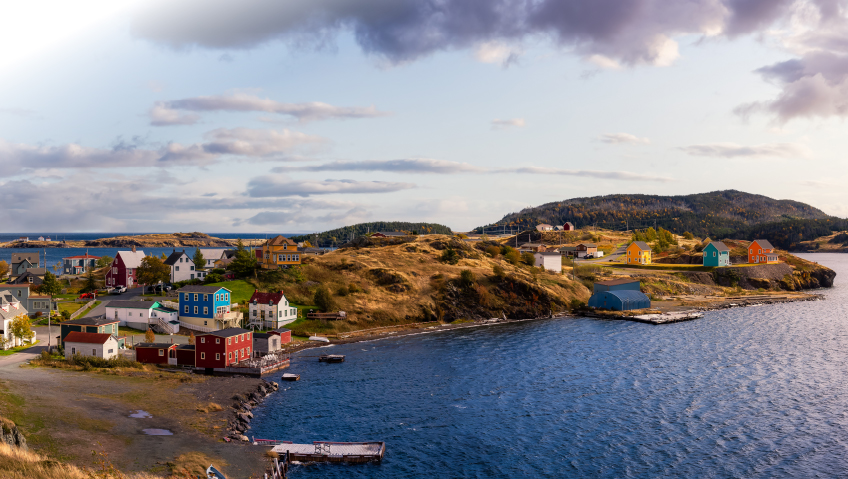Last fall, a couple decided to do a whale watching tour off tiny Brier Island in south-western Nova Scotia, Canada. The area is known for its bird watching, whales in the Bay of Fundy, and the occasional seal popping its head up to say hello. The couple wondered how crowded the fifty-foot boat might be and how close they would be to other passengers, bouncing over the waves.
They needn’t have worried. It turns out that local tour operators have planned for this, as staged re-openings occur across the world. Only about twenty people ended up on the boat. Each family was asked to wear masks as they wandered around the boat deck for pictures of the sea life, though, while sitting in their assigned seats, they could remove their masks.
It is these kinds of changes that businesses around the world have had to undergo to get travellers moving again. Restaurants have to section off parts of their dining areas. Tour operators have to make sure everyone is wearing masks. Rental car companies and hotels have had to adapt to a level of cleaning unheard of a year ago.
This is all a mess, but there is hope. Destination Canada’s Executive Director of Industry Partnerships Sebastien Dubois says his organization’s research shows that people still want to travel, and he is certain that when it is safe to do so, the travel numbers will rise. In fact, he said, it is already getting better.
“We’ve been seeing improvements, and it’s showing the value of tourism,” Dubois said. “We want Canadians to realize the value of travelling in their own country.”
He said if Canadians spend two-thirds of the money they were planning to spend on international travel in domestic travel instead, they would bring nineteen billion dollars into the economy and would help save 150,000 jobs across the country. It is paramount, he said, to get people to realize the value of travel, get them to discover the benefits of what is in their backyard.
“We need to get Canadians ready to welcome visitors, either from their own province or the province next door or internationally,” he added, “and then we need to make sure the airline routes are all back up and running.”
As with any industry, the unknown is a big problem, he said, as things change every day at both the provincial and municipal levels. It is certainly harder for anyone to make plans. Promoting tourism locally seems to be one way past the slowdown, as is getting through the vaccination programs.
“Everyone is making plans in terms of getting ready for people to start travelling. We know we want to have Canadians to travel in Canada,” said Dubois. “We’re lucky to be in this country, and we’re doing all we can to get Canadians to start dreaming about travelling within their own country again.”
Atlantic Canada has had fewer COVID-19 cases than most of Canada, which puts it in the position to hopefully return to some semblance of normalcy a little faster than other provinces and U.S. states. Tourism Nova Scotia Chief Executive Officer Michelle Saran says although the pandemic has made the job more challenging, there is hope on the horizon for the East Coast.
“We’ve earned the reputation of being a safe destination because we’ve been so effective at following public health protocols,” she said. “We’ve had some positive press from the Globe and Mail, the New York Times, and Bloomberg. They’ve all lauded us as a safe destination that has managed everything well, so we do believe that this bodes well for when the borders are lifted and the quarantine measures are lifted because research shows that safety is going to be important for visitors going forward.”
The Province of Nova Scotia began its outreach to remote workers at the beginning of this year with a website and campaign to entice people who were working from home in other provinces to move to Nova Scotia. Saran said the lower cost of living compared to more populous areas like Toronto or Vancouver, combined with its natural beauty makes it very attractive to those who may have roots in Nova Scotia or may want to move to a more stable environment.
Saran said everything is still uncertain but added that there is cause for optimism.
“We have operational experience under our belt. We know how to open and close safely, and we have the vaccine rollout happening in our target markets,” she said. “In the short term, we expect a mainly local market for tourism. We don’t expect any cruise ships or international markets, but there is strong potential for the Atlantic bubble reopening, so we’ll continue to follow public health advice.”
She added that the province is preparing to expand marketing efforts, so when one market opens, it will be ready to go with campaigns.
“We also know that from what we’re hearing from analytics and from Destination Canada that there’s pent-up demand,” she continued. “People are doing a lot of searches, and they’re trying to book Nova Scotia. They’re seeking out what public health looks like here. We know there’s pent-up demand, and I know there will be quite a travel search when the fourteen-day isolation goes away.”
Dubois agreed. He pointed out that Destination Canada’s studies show people are still dreaming of travel, showing that eighty percent of surveyed Canadians are getting ready to travel when the restrictions are up.
“We also know that people don’t book a trip for tomorrow – not yet anyway – a dream plan means months in planning,” Dubois said. “We want to stay top of mind in our key markets, so we are starting to work with those key accounts in international markets, and we need to be ready when international travellers are ready to book a trip to Canada, whenever that may be, fall, winter, whatever.”
South of the border, restrictions seem to be easing, even though the infection numbers are still quite high. In the middle of the pandemic, state officials said the tourism industry had lost nearly $2 billion. However, with the vaccine rollout being a little faster in the United States than it has been in Canada, traditional tourism hotspot Florida is starting to reopen.
News reports show some towns in that state and others in places like Alaska and Texas, have been offering vaccines to non-residents in an attempt to attract visitors. Traditional theme park destinations, like Walt Disney World, have social distancing rules and new hygiene processes in place according to the staff at Visit Florida, one of the state’s tourism boards, but it will be interesting to what will happen in the coming months as restrictions ease.
In the meantime, residents in eastern Canada are being asked, through advertising campaigns, to get out and explore as the first step in opening to outsiders. The pandemic also offers tour operators the chance to improve their businesses with some new educational offerings.
“In Atlantic Canada, we fall behind with digital acumen compared to the rest of the country, and COVID has driven us online more than ever, so a complete business needs a strong online presence,” said Saran. “So, we’ve been offering training to help people [improve] their digital profile to support digital technologies. We’ve been offering website boot camps so that people who never had a website before can get online.”
Another thing Saran mentioned is that there is a need for places like Nova Scotia to become four-season destinations. This has been talked about for years, but she noted that the pandemic has shown that tourist areas have to start creating offerings for fall and winter to drive year-round visitation.
For business to get back to normal, public health and safety measures are paramount. “We need our public health leaders to stand up and say when it is safe to travel,” she said. “We’ve done a great job of scaring people into staying home to be safe, but when it’s safe to do so, they need to help the economy and say when it’s okay to take a trip again.”
Dubois said Destination Canada will continue marketing to traditional markets, like Germany and the United Kingdom. He hopes to work with those key accounts internationally and to be ready when those international travellers want to book trips to Canada.






